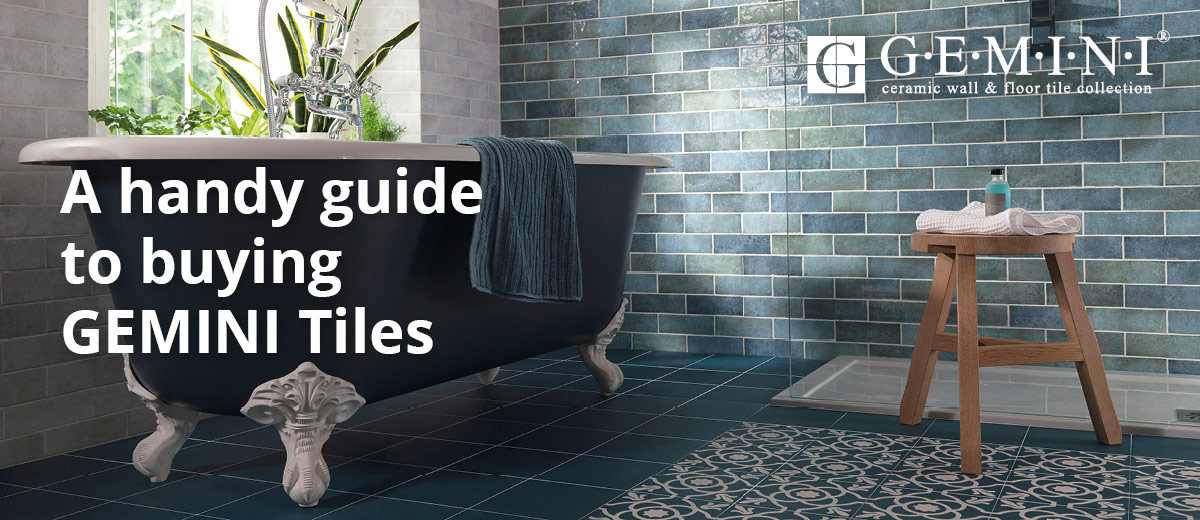
GEMINI Guidelines
 Glazed Ceramic Tiles*
Glazed Ceramic Tiles*This is the most common type of tile. They possess specific technical properties and a glaze coating that physically and hygienically protects the tiles. Glazed ceramic tiles are available in many different sizes and thicknesses. Designs and colours can be applied during the firing of the tile, making these a very common and adaptable internal tile. Browse our range of
Glazed Ceramic Floor Tiles and
Glazed Ceramic Wall Tiles.
How to fix ceramic tiles?*
The base is clay-based and porous; bucket cement is normally used to fix these tiles. They are used internally on walls and floors. Floor tiles are generally thicker and stronger, as they carry weight and more traffic.How to cut ceramic tiles?*
You can cut them by scoring the ceramic surface and then by snapping using pressure.
Tile cutters are readily available.
 Porcelain Tiles*
Porcelain Tiles*
Porcelain tiles are very durable, low porosity tiles suitable for domestic and most commercial applications. They can be fitted to walls and floors, however, always check to ensure that the wall can bear the weight of these tiles. Browse our range of
Porcelain Floor Tiles and
Porcelain Wall Tiles.
How to fix porcelain tiles?*
Always fix porcelain tiles using cement-based adhesive like BAL Single Part Flexible. Plasterboard and plaster walls must be primed before fixing using BAL Primer APD for example.How to cut porcelain tiles?*
As an extremely hard material, cutting can be a problem. For best results, cut these tiles with a diamond-bladed wet saw.
Do porcelain tiles require sealing?*
Due to their very low absorbency, Vitrified or Fully Vitrified porcelain tiles do not normally require sealing. Polished tiles, however, have a slight degree of microporosity as a result of the polishing process. If used in areas subject to a high level of spillage, polished tiles can be sealed to further protect. Matt tiles can also be sealed in high-risk areas, e.g. light coloured tiles on commercial kitchen floors.
 Glazed Porcelain Tiles*
Glazed Porcelain Tiles*These are porcelain tiles with an opaque to transparent coating that have been fired to the tile biscuit. This type of tile has a vitreous covering on the face of the tile, which is impermeable. Browse our range of
Glazed Porcelain Floor Tiles and
Glazed Porcelain Wall Tiles. Rectified Tiles*
Rectified Tiles*
A rectified tile has been mechanically cut to size after the firing process. This process creates a precise edge and, as a result, can be laid with a tighter grout joint than an unrectified tile. Great care must be taken when fixing to ensure tiles are fixed flat and not lipped.
 Glass Mosaic Tiles*
Glass Mosaic Tiles*
Glass Mosaics are suitable for walls in all internal installations and for domestic bathroom floors, where they will only be subject to light foot traffic. In some ranges a slip resistant ‘grip’ finish is available for wet floors such as walk-in showers. Browse our range of
Glass Wall Tiles.
How to fix glass mosaic tiles?*
Glass mosaics should always be fixed with white cement-based adhesive e.g. BAL Mosaic-Fix. When fixing to plaster and plasterboard, the surface should be first primed with BAL Primer APD or similar. Glass mosaics are supplied on sheets and when fixing the fabric mesh goes towards the wall, setting them in line to obtain a correct vertical and horizontal meeting of joints. Tap the surface of the mosaics with a rubber float to ensure adequate adhesion and flatness.
Some glass mosaics may be supplied with brown paper sheets with or without a fabric mesh. These are fixed in the same way, but with the brown paper facing out. When the adhesive has set, wet the paper thoroughly with a sponge and peel the paper off holding one corner. Please be aware that due to the translucent nature of glass mosaic, final colour and shade of the fixed material can vary especially depending on lighting and location.
 Natural Stone Products*
Natural Stone Products*
General Fixing Guidance: Before purchasing your stone, please check that it is suitable for the application you wish to use it for.
-
Surfaces must be clean, dry, and free of contamination.
-
Use the solid bed fixing method incorporating an appropriate notched trowel and fill any voids in the back of the tile. When fixing to skimmed plaster or gypsum plasterboard, prime prior to tiling with BAL PRIMER APD.
-
Ideally fix natural stone with a rapid setting cement-based adhesive. Due to the porosity of certain stones, staining can occur if a normal setting adhesive is used. White adhesive should always be used with pale stones and when using a light coloured grout. Either BAL RAPID SET WHITE or BAL RAPID SET FLEXIBLE (if background is prone to movement) are suitable adhesives for most backgrounds on floors and walls. It is recommended that BAL FAST FLEX is used for overlaid timber floors to minimise any chance of movement damage.
-
Grouting of stone can be done in the same way as any other tile. In the case of Travertine, an extra quantity should be allowed for to fill the voids in the stone. Standard cement-based or polymer-modified grouts, BAL WIDE JOINT GROUT, BAL SUPERFLEX, BAL MICROFLEX, or BAL MICROCOLOUR can all be used. Check to see which would be the most appropriate for your application. Ensure that any grout is removed from the surface before sealing by washing the floor/wall with a dilute solution of LITHOFIN POWER CLEAN.
-
Further sealing will be required after grouting as stone can stain. On most occasions this is due to an inadequate amount of sealer being applied during the fixing process and the tiles not being fully sealed. Properly sealed stone is easier to maintain.
-
Please note that it is not recommended that you clean most stone with ordinary household detergents as they are acidic and can damage most stone.
 Wood Burner Surrounds*
Wood Burner Surrounds*
Tiles are suggested for use on wood burner and multi-fuel stove surrounds, hearths and chimney breasts as a decorative feature only. These tiles should not come into close contact with heat sources or naked flames. This is a suggestion only and we advise to check for specific suitability of tiles and associated fixing products prior to installation. Browse our suggested
Fireplace Floor Tiles and
Fireplace Wall Tiles.
It is common practice to check batch numbers on wallpaper. Please apply the same care before fixing tiles. Shade variation is an inherent feature of some ceramics and it is therefore imperative that you visually check blends prior to fixing. Care should always be taken to ensure that sufficient tiles are purchased within the same batch to complete the job as well as retaining some spares in case of damage, as no claims for variations or quality can be entertained after fixing.
To help you distinguish the shading and pattern on a tile we have provided the following ratings:
Uniform colour with minimum or no variation within a batch. Slight variation within an individual tile and small degree of variation from tile to tile within a batch. Increased variation within an individual tile some degree of variation from title to tile within a batch. Distinctive variation within an individual tile and significant variation from tile to tile within the batch.
Frost-resistant Tiles*
Tiles specifically designed by the manufacturer to withstand freezing/thaw conditions are suitable for exterior applications exposed to the elements, high humidity and very low temperatures.
Crazing
A fine hairline cracking which sometimes appears on the glaze of the tile. This is usually caused by tensile stress between the tile biscuit and glaze. This may have been intentionally produced for artistic effect.
Tile Thickness
Manufacturers do make changes to the tile thickness and if this is particularly important to you, please check before ordering.
PEI Ratings (Floor Grade)
The construction and qualities of tiles differ greatly. One classification that influences / affects where to use specific tiles is Abrasion Resistance PEI ratings. Here are four different classifications of Abrasion Resistance:

- Light traffic. Residential wall use and bathroom floor applications.

- Light to moderate traffic. Residential wall and floor use.

- Moderate to heavy traffic. Residential wall and floor use with external access.

- Heavy traffic. All residential wall and floor use with external access.
Please note: We would recommend the use of a door mat within a mat well to all external doors.
R Ratings (Anti-slip Grade)The R rating of a floor tile refers to slip resistance and how safe it is to use in environments where the floor is inclined or likely to get wet. R ratings are mainly considered when fixing tiles in a commercial or public space but have been stated where available for reference. The lowest rating available is R9. The classifications are as follows:
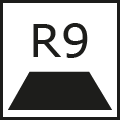
- Slip likely to occur between 3
o-10
o incline. Suitable for entrance areas, stairs, dining rooms and living spaces.

- Slip likely to occur between 10
o-19
o incline. Suitable for toilets and wash rooms.
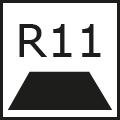
- Slip likely to occur between 19
o-27
o incline. Suitable for domestic kitchens / small commercial kitchens.
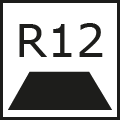
- Slip likely to occur between 27
o-35
o incline. Suitable for domestic kitchens / large commercial kitchens.
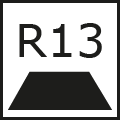
- Slip likely to occur over 35
o incline.
Please note: We would recommend the use of a door mat within a mat well to all external doors.
Browse our range of Anti-slip Floor Tiles.
*We strongly recommend the use of a professional tiling contractor.